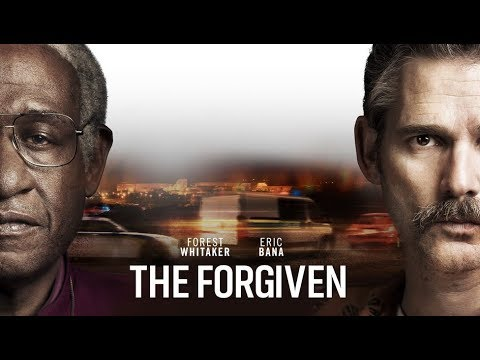Susan Granger’s “The Forgiven” (Saban Films)
Based on Michael Ashton’s play, “The Archbishop and the Antichrist,” this intense docudrama examines the (fictionalized) relationship between the iconic South African cleric Desmond Tutu and a notorious, white-supremacist murderer who is seeking clemency.
In the mid-1990s when the Archbishop (Forest Whitaker) was appointed by then-President Nelson Mandela to head the Truth and Reconciliation Committee to confront the atrocities of apartheid, one of the defendants was Afrikaner Piet Blomfeld (Eric Bana), an unrepentantly racist psychopath.
To capture the Archbishop’s attention, Blomfeld wrote him an articulate letter, referencing Plato and Milton. And, according to compassionate Desmond Tutu: “No one is beyond redemption.”
Incarcerated in Cape Town’ brutal maximum-security Pollsmoor Prison, Blomfeld’s past is explored in flashbacks, juxtaposed with a larger investigation of Operation Hacksaw, a police conspiracy that resulted in the disappearance of a black teenager whose grieving mother (Thandi Makhubele) pleads for justice in a climactic courtroom scene.
Burdened by a distracting prosthetic nose, Forest Whitaker delivers a powerhouse performance that’s been enthusiastically endorsed by Desmond Tutu himself – and he’s matched by surly Eric Bana’s charismatic savagery.
In an interview with “Entertainment Tonight,” Whitaker expressed gratitude that he was able to meet Tutu before he took on the role. Noting, “I was trying to understand the man. I knew his laugh and sense of humor. I knew how his felt, his passion, his faith, etc… I was trying to capture the spirit of the man.”
Adapted by playwright Michael Ashton and director Roland Joffe (“The Killing Fields,” “The Mission”), it’s unfocused, slowly paced and overly earnest. In addition, its theatrical origins are obvious, resulting in stilted, overly talky confrontations.
On the other hand, William Wages’ cinematography captures South Africa’s imagery, particularly when it’s augmented by Zethu Mashika’s mournful music.
If the inflammatory subject matter seems familiar, somewhat similar situations were previously depicted in John Boorman’s “In My Country” and Tom Hooper’s “Red Dust.”
On the Granger Movie Gauge of 1 to 10, “The Forgiven” is an overly formal 5, better suited to the stage.

